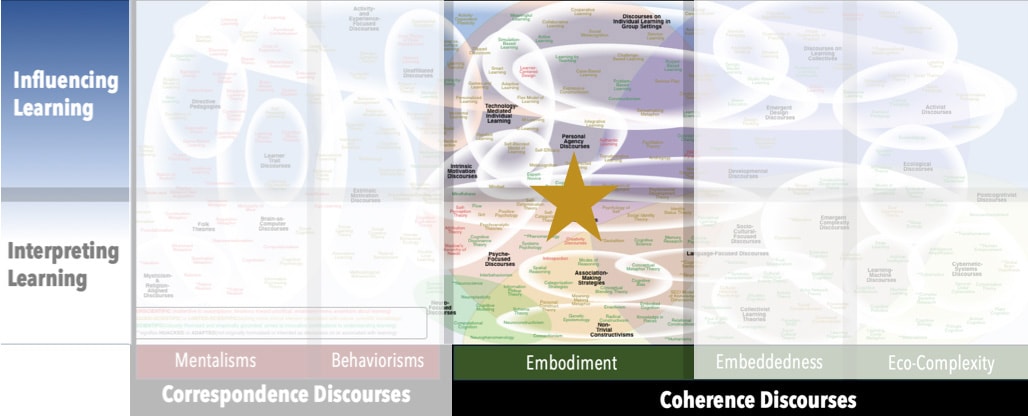Focus
Emergence, development, and maintenance of senses of selfPrincipal Metaphors
- Knowledge is … scope of possible identities
- Knowing is … being; self-awareness
- Learner is … an evolving agent
- Learning is … becoming
- Teaching is … N/A
Originated
Varied, but mainly through the first half of the 20th centurySynopsis
Psychology of Self is an umbrella category that reaches across a range of theories focused on matters of self-identity across multiple situations. Most of these theories attempt to explain how selves are formulated and maintained. Attempting a few-line summary of any of these theories would be profoundly misrepresentative, but a list of broad categories and associated discourses can be offered:- perspectives informed/oriented by Psychoanalytic Theories, which typically focus on relationships (esp. with parents) and that underscore the role on non-conscious identifications and associations in framing and sustaining one’s sense of self.
- memory-based perspectives, which view the one’s personal sense of identity as a combination of long-term, episodic and/or semantic memories. (See Memory Science.)
- social- and relationship-based perspectives, which link one’s identity to one’s identifications, seeing connections to and interactions with others as the primary site of self-definition. (See, e.g., Symbolic Interactionism and Social Identity Theory.)
- emergentist perspectives, which see the self as a system, emerging from sub-personal systems, coupled to other self-systems, and embedded in various social and cultural systems. (See, e.g., Complex Systems Research and Second-Order Cybernetics.)
- behavior-based perspectives, which posit that conceptions of self arise as one crafts explanations for actions, sensations, and accumulations of experience. (See, e.g., Self-Perception Theory and Developmental Discourses.)
- Meta-Perception (Daryl Bem, 1970s) – one’s ability to perceive how others perceive one’s traits and behaviors
- Transpersonal Psychology (Spiritual Psychology; Transpersonal Theory) (Abraham Maslow, Victor Frankl, 1960s) – a variously defined branch of psychology that presses beyond the personal into matters of the spiritual and the transcendent. Topics encountered in Transpersonal Psychology include peak and mystical experiences, spiritual evolution, altered states of consciousness, developmental stages beyond the socialized adult, and connectedness with phenomena normally understood as exterior to or beyond the ego.
Commentary
Because it is a category of quite diverse theories rather than a singular coherent perspective, it doesn’t make much sense to offer general commentaries on or criticisms of Psychology of Self.Authors and/or Prominent Influences
DiffuseStatus as a Theory of Learning
Most theories under the umbrella of Psychology of Self can be understood as theories of learning, especially if the principal focus of learning is seen to be one’s own identity.Status as a Theory of Teaching
Theories under the umbrella of Psychology of Self are, in the main, not theories of teaching – although some were formulated with explicit interests in affecting senses of self (e.g., those associated with Psychoanalytic Theories).Status as a Scientific Theory
The dramatic variance of perspectives and interpretations represented within Psychology of Self might be taken as an indication that the construct of “self” is not yet sufficiently understood for the domain to properly described as scientific.Subdiscourses:
- Meta-Perception
- Transpersonal Psychology (Spiritual Psychology; Transpersonal Theory)
Map Location

Please cite this article as:
Davis, B., & Francis, K. (2025). “Psychology of Self” in Discourses on Learning in Education. https://learningdiscourses.com.
⇦ Back to Map
⇦ Back to List
